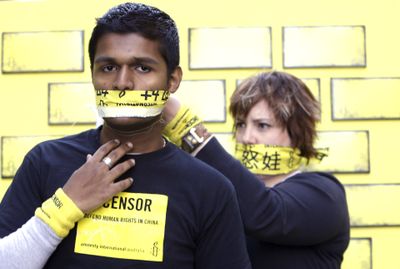China loosens restrictions on Internet
Government pressured by foreign criticism

BEIJING – China on Friday opened major cracks in its Great Firewall, allowing Internet users in the nation’s largest cities rare glimpses at foreign Web sites that censors have blocked for years.
China loosened its Internet restrictions after several days of intense foreign criticism that it had reneged on a pledge to relax censorship around the period of the Aug. 8-24 Beijing Olympic Games.
In a highly unusual meeting with a group of foreign journalists early Friday, President Hu Jintao said that China would stand by the pledges of openness it made in 2001 when it was bidding for the right to host this year’s Summer Games.
Hu warned foreign journalists to abide by Chinese laws but said that even after the Games are over, China will “welcome foreign journalists and facilitate their reporting.”
China now has 253 million Internet users, more than any other country in the world.
Shortly after Hu’s meeting with foreign reporters, the broad easing of Internet controls was readily apparent in Beijing and Shanghai, China’s two largest cities.
“We have been blocked since 2003. The fact that our Web site is unblocked is very good news,” said Vincent Brossel, the head of the Asia desk of Reporters Without Borders, a Paris-based group that has been harshly critical of China’s censorship and the imprisonment of dozens of journalists and dissidents for their postings on the Internet.
Web sites run by human rights groups such as Amnesty International and Human Rights Watch also were unblocked. The main Pentagon Web site became accessible, as did numerous foreign media sites.
A smattering of Web sites remained blocked, however, including those linked to the banned Falun Gong spiritual movement.